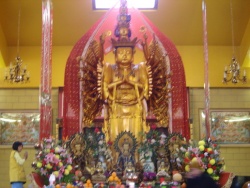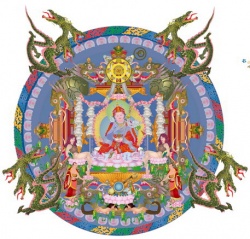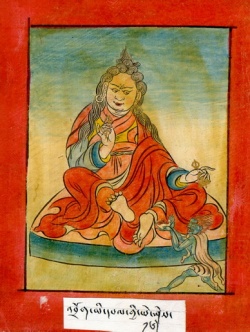Difference between revisions of "Akusala Citta and Akusala Vipaka Citta"
| (One intermediate revision by the same user not shown) | |||
| Line 2: | Line 2: | ||
| − | All ten [[akusala kamma]] are done with these 12 [[akusala citta]]. There are 8 greed-rooted, 2 hatred-rooted, and 2 delusion-rooted [[citta]]. Of course [[citta]] (pronounced “chiththä”) are [[thoughts]]; any {{Wiki|speech}} or [[bodily action]] starts with a [[thought]]. | + | All ten [[akusala kamma]] are done with these 12 [[akusala citta]]. There are 8 [[greed]]-rooted, 2 [[hatred]]-rooted, and 2 [[delusion]]-rooted [[citta]]. Of course [[citta]] (pronounced “chiththä”) are [[thoughts]]; any {{Wiki|speech}} or [[bodily action]] starts with a [[thought]]. |
* See, “[[Conditions for the Four Stages of Nibbana]]” for a list of 12 [[akusala citta]]. | * See, “[[Conditions for the Four Stages of Nibbana]]” for a list of 12 [[akusala citta]]. | ||
| Line 18: | Line 18: | ||
| style="text-align: center;" | 1 | | style="text-align: center;" | 1 | ||
| style="text-align: center;" | [[Greed]] | | style="text-align: center;" | [[Greed]] | ||
| − | | style="text-align: center;" | <span style="color: #ff0000;"><strong> | + | | style="text-align: center;" | <span style="color: #ff0000;"><strong>Wrong view</strong></span> |
| style="text-align: center;" | – | | style="text-align: center;" | – | ||
| style="text-align: center;" | [[Pleasure]] | | style="text-align: center;" | [[Pleasure]] | ||
| Line 25: | Line 25: | ||
| style="text-align: center;" | 2 | | style="text-align: center;" | 2 | ||
| style="text-align: center;" | [[Greed]] | | style="text-align: center;" | [[Greed]] | ||
| − | | style="text-align: center;" | <span style="color: #ff0000;"><strong> | + | | style="text-align: center;" | <span style="color: #ff0000;"><strong>Wrong view</strong></span> |
| style="text-align: center;" | – | | style="text-align: center;" | – | ||
| style="text-align: center;" | [[Pleasure]] | | style="text-align: center;" | [[Pleasure]] | ||
| Line 46: | Line 46: | ||
| style="text-align: center;" | 5 | | style="text-align: center;" | 5 | ||
| style="text-align: center;" | [[Greed]] | | style="text-align: center;" | [[Greed]] | ||
| − | | style="text-align: center;" | <strong><span style="color: #ff0000;"> | + | | style="text-align: center;" | <strong><span style="color: #ff0000;">Wrong view</span></strong> |
| style="text-align: center;" | – | | style="text-align: center;" | – | ||
| style="text-align: center;" | [[Equanimity]] | | style="text-align: center;" | [[Equanimity]] | ||
| Line 53: | Line 53: | ||
| style="text-align: center;" | 6 | | style="text-align: center;" | 6 | ||
| style="text-align: center;" | [[Greed]] | | style="text-align: center;" | [[Greed]] | ||
| − | | style="text-align: center;" | <span style="color: #ff0000;"><strong> | + | | style="text-align: center;" | <span style="color: #ff0000;"><strong>Wrong view</strong></span> |
| style="text-align: center;" | – | | style="text-align: center;" | – | ||
| style="text-align: center;" | [[Equanimity]] | | style="text-align: center;" | [[Equanimity]] | ||
| Line 103: | Line 103: | ||
1. The first [[citta]] is described as, ” a [[thought]] rooted in [[greed]] (and [[delusion]]), associated with [[wrong views]], accompanied by [[pleasure]], and spontaneous”. The others can be stated the same way. | 1. The first [[citta]] is described as, ” a [[thought]] rooted in [[greed]] (and [[delusion]]), associated with [[wrong views]], accompanied by [[pleasure]], and spontaneous”. The others can be stated the same way. | ||
| − | * Those [[citta]] that are associated with [[wrong views]] are the worst, even though [[wrong views]] are listed as #10 on the | + | * Those [[citta]] that are associated with [[wrong views]] are the worst, even though [[wrong views]] are listed as #10 on the [[ten immoral actions]], see, “[[Ten Immoral Actions]] ([[Dasa Akusala]])“. |
* [[Citta]] generated with [[pleasure]] means one is {{Wiki|enthusiastic}} about it because of one’s [[habits]] (gathi) or one starts liking it. For example, one who likes to go fishing has a bad [[Wikipedia:Habit (psychology)|habit]]; he gets a [[pleasure]] by just [[thinking]] about it; thus it is stronger than one done with [[equanimity]]. | * [[Citta]] generated with [[pleasure]] means one is {{Wiki|enthusiastic}} about it because of one’s [[habits]] (gathi) or one starts liking it. For example, one who likes to go fishing has a bad [[Wikipedia:Habit (psychology)|habit]]; he gets a [[pleasure]] by just [[thinking]] about it; thus it is stronger than one done with [[equanimity]]. | ||
* The hateful [[citta]] are always done with [[displeasure]], but that [[displeasure]] can arise with [[ignorance]]. For example, someone who has [[wrong views]] may generate [[displeasure]] towards a [[moral]] [[person]] merely because of one’s [[wrong views]]. I have encountered some [[people]] who got upset with me when I pointed out that [[rebirth]] has {{Wiki|evidence}} for it; this is why I do not get involved in discussions and [[debates]] anymore. | * The hateful [[citta]] are always done with [[displeasure]], but that [[displeasure]] can arise with [[ignorance]]. For example, someone who has [[wrong views]] may generate [[displeasure]] towards a [[moral]] [[person]] merely because of one’s [[wrong views]]. I have encountered some [[people]] who got upset with me when I pointed out that [[rebirth]] has {{Wiki|evidence}} for it; this is why I do not get involved in discussions and [[debates]] anymore. | ||
| Line 109: | Line 109: | ||
* See, the notes at the end of the post “[[Conditions for the Four Stages of Nibbana]]” for details. | * See, the notes at the end of the post “[[Conditions for the Four Stages of Nibbana]]” for details. | ||
| − | 2. Since vicikicca is also due to [[wrong views]], those five [[cittas]] marked in [[red]] are the strongest [[akusala citta]] done with “[[wrong views]]” or ‘[[ditthi]]“. They can [[condition]] one’s [[mind]] to a “gathi” suitable for [[birth]] in the [[apayas]] | + | 2. Since [[vicikicca]] is also due to [[wrong views]], those five [[cittas]] marked in [[red]] are the strongest [[akusala citta]] done with “[[wrong views]]” or ‘[[ditthi]]“. They can [[condition]] one’s [[mind]] to a “gathi” suitable for [[birth]] in the [[apayas]] |
| − | * The [[vyapada]] or the strong [[hate]] — that makes one eligible for [[birth]] in the [[apayas]] –actually arises from the first four types of [[lobha | + | * The [[vyapada]] or the strong [[hate]] — that makes one eligible for [[birth]] in the [[apayas]] –actually arises from the first four types of [[lobha citta]]. It is also called “[[dvesa]]” or “[[dvesha]]” which means “second [[manifestation]]” or (“dvi +”vesa“) of [[lobha]]. When one is burdened with extreme [[greed]], it can turn to the second [[manifestation]] of extreme [[hate]] for anyone in the way. |
| − | * Upon [[attaining]] the [[Sotapanna]] stage, such [[habits]] or “gathi” are removed, and thus no adverse [[kamma | + | * Upon [[attaining]] the [[Sotapanna]] stage, such [[habits]] or “gathi” are removed, and thus no adverse [[kamma vipaka]] come to the [[mind]] at the dying [[moment]], as we point out below. The “pati+ichcha sama+uppada” or what is born is similar to what is grasped, is at play at the dying [[moment]]. One automatically [[grasps]] things one has a [[Wikipedia:Habit (psychology)|habit]] of liking; they automatically come to the forefront of the [[mind]] at the dying [[moment]]. |
3. The other 7 [[akusala citta]] are stopped from [[arising]] in stages as a [[Sotapanna]] cultivates the [[Path]] further. | 3. The other 7 [[akusala citta]] are stopped from [[arising]] in stages as a [[Sotapanna]] cultivates the [[Path]] further. | ||
| − | * The two dislike (patigha)-rooted [[cittas]] (together with some [[potency]] of the remaining 4 greed-based [[citta]], i.e., [[kama raga]]) are reduced at the [[Sakadagami]] stage. | + | * The two dislike ([[patigha]])-rooted [[cittas]] (together with some [[potency]] of the remaining 4 greed-based [[citta]], i.e., [[kama raga]]) are reduced at the [[Sakadagami]] stage. |
| − | * Those two dislike-rooted [[citta]], together with [[kama raga]], are stopped at the | + | * Those two dislike-rooted [[citta]], together with [[kama raga]], are stopped at the [[Anagami]] stage. |
* Finally, the remaining 4 greed-based [[citta]] and the uddacca [[citta]] are removed at the [[Arahant]] stage. Thus an [[Arahant]] will never [[experience]] an [[akusala citta]]. | * Finally, the remaining 4 greed-based [[citta]] and the uddacca [[citta]] are removed at the [[Arahant]] stage. Thus an [[Arahant]] will never [[experience]] an [[akusala citta]]. | ||
4. These 12 types of [[citta]] lead to 7 types of [[vipaka]] (resultant) [[citta]]. | 4. These 12 types of [[citta]] lead to 7 types of [[vipaka]] (resultant) [[citta]]. | ||
| − | * None of the | + | * None of the [[vipaka citta]] has any [[unwholesome]] [[roots]] ([[greed]], [[hate]], [[delusion]]); of course they also do not have the [[wholesome roots]]. Thus they are called rootless ([[ahétuka]]) [[citta]]. |
5. Five of these [[akusala vipaka]] [[citta]] are the ones that lead to (undesirable) [[sense]] events through the [[five physical senses]]. Thus they are responsible for [[eye consciousness]] ([[cakkhu vinnana]]), [[ear consciousness]] ([[sota vinnana]]), [[nose consciousness]] ([[ghana vinnana]]), [[taste consciousness]] ([[jivha vinnana]]), and [[body consciousness]] ([[kaya vinnana]]). | 5. Five of these [[akusala vipaka]] [[citta]] are the ones that lead to (undesirable) [[sense]] events through the [[five physical senses]]. Thus they are responsible for [[eye consciousness]] ([[cakkhu vinnana]]), [[ear consciousness]] ([[sota vinnana]]), [[nose consciousness]] ([[ghana vinnana]]), [[taste consciousness]] ([[jivha vinnana]]), and [[body consciousness]] ([[kaya vinnana]]). | ||
| Line 134: | Line 134: | ||
7. The seventh [[akusala vipaka]] [[citta]] is called the [[investigating consciousness]] accompanied by [[equanimity]] (upekkha-sahagata [[santirana citta]]). This is the [[citta]] that is responsible for the [[birth]] in the [[apayas]] (lowest [[four realms]]), i.e, it acts as the [[patisandhi citta]] for the [[birth]] in the [[apayas]]. | 7. The seventh [[akusala vipaka]] [[citta]] is called the [[investigating consciousness]] accompanied by [[equanimity]] (upekkha-sahagata [[santirana citta]]). This is the [[citta]] that is responsible for the [[birth]] in the [[apayas]] (lowest [[four realms]]), i.e, it acts as the [[patisandhi citta]] for the [[birth]] in the [[apayas]]. | ||
| − | 8. One may [[wonder]] how a [[Sotapanna]] avoids the [[apayas]], because he/she is still capable of generating the 7 [[cittas]] that are not associated with [[ditthi]] (see the Table above), and thus it is possible to generate this apayagami-patisandhi | + | 8. One may [[wonder]] how a [[Sotapanna]] avoids the [[apayas]], because he/she is still capable of generating the 7 [[cittas]] that are not associated with [[ditthi]] (see the Table above), and thus it is possible to generate this [[apayagami-patisandhi citta]]. The point is that after becoming a [[Sotapanna]], such [[vipaka]] [[thoughts]] do not come to the [[mind]] at the last [[thought]] {{Wiki|processes}}; only the [[good kamma]] [[vipaka]] come to the forefront of the [[mind]] close to the dying [[moment]] because he/she no longer has the “[[gathi]]” suitable for a [[birth]] in the [[apayas]]. |
| − | 9. It is hard to give up one’s bad [[habits]] ( | + | 9. It is hard to give up one’s bad [[habits]] (“[[gathi]]“), mainly because one does not fully comprehend the [[true nature]] of the [[world]], i.e., [[anicca]], [[dukkha]], [[anatta]], and thus has [[wrong views]] about this [[world]] with [[31 realms]]. One needs to comprehend that one’s [[actions]] have {{Wiki|consequences}} not only in this [[life]], but (mainly) in the {{Wiki|future}} [[lives]]; also, whatever one gains by such harmful [[actions]] is just temporary, AND do not leave one with a [[peace]] [[mind]]. |
{{R}} | {{R}} | ||
Latest revision as of 06:53, 8 March 2016
All ten akusala kamma are done with these 12 akusala citta. There are 8 greed-rooted, 2 hatred-rooted, and 2 delusion-rooted citta. Of course citta (pronounced “chiththä”) are thoughts; any speech or bodily action starts with a thought.
- See, “Conditions for the Four Stages of Nibbana” for a list of 12 akusala citta.
Both greed-rooted and hatred-rooted also have delusion as a root.
| Root | Assoc. with | Dissoc. with | Feeling | With habit/Forced | |
| 1 | Greed | Wrong view | – | Pleasure | Spontaneous |
| 2 | Greed | Wrong view | – | Pleasure | Forced/Reluctant |
| 3 | Greed | – | Wrong view | Pleasure | Spontaneous |
| 4 | Greed | – | Wrong view | Pleasure | Forced/Reluctant |
| 5 | Greed | Wrong view | – | Equanimity | Habit |
| 6 | Greed | Wrong view | – | Equanimity | Forced/Reluctant |
| 7 | Greed | – | Wrong view | Equanimity | Spontaneous |
| 8 | Greed | – | Wrong view | Equanimity | Forced/Reluctant |
| 9 | Dislike | Aversion | – | Displeasure | Spontaneous |
| 10 | Dislike | Aversion | – | Displeasure | Forced/Reluctant |
| 11 | Delusion | Vicikicca | – | Equanimity | – |
| 12 | Delusion | Uddacca | – | Equanimity | – |
1. The first citta is described as, ” a thought rooted in greed (and delusion), associated with wrong views, accompanied by pleasure, and spontaneous”. The others can be stated the same way.
- Those citta that are associated with wrong views are the worst, even though wrong views are listed as #10 on the ten immoral actions, see, “Ten Immoral Actions (Dasa Akusala)“.
- Citta generated with pleasure means one is enthusiastic about it because of one’s habits (gathi) or one starts liking it. For example, one who likes to go fishing has a bad habit; he gets a pleasure by just thinking about it; thus it is stronger than one done with equanimity.
- The hateful citta are always done with displeasure, but that displeasure can arise with ignorance. For example, someone who has wrong views may generate displeasure towards a moral person merely because of one’s wrong views. I have encountered some people who got upset with me when I pointed out that rebirth has evidence for it; this is why I do not get involved in discussions and debates anymore.
- Spontaneous means “it just comes out”, because of the “gathi” of the person or because of the conditions at that time; thus they are stronger than “forced”, which arise when someone else is encouraging to do it, or when one realizes it is a bad thought but thinking about the “pleasures to be had”, encourages oneself to do it.
- See, the notes at the end of the post “Conditions for the Four Stages of Nibbana” for details.
2. Since vicikicca is also due to wrong views, those five cittas marked in red are the strongest akusala citta done with “wrong views” or ‘ditthi“. They can condition one’s mind to a “gathi” suitable for birth in the apayas
- The vyapada or the strong hate — that makes one eligible for birth in the apayas –actually arises from the first four types of lobha citta. It is also called “dvesa” or “dvesha” which means “second manifestation” or (“dvi +”vesa“) of lobha. When one is burdened with extreme greed, it can turn to the second manifestation of extreme hate for anyone in the way.
- Upon attaining the Sotapanna stage, such habits or “gathi” are removed, and thus no adverse kamma vipaka come to the mind at the dying moment, as we point out below. The “pati+ichcha sama+uppada” or what is born is similar to what is grasped, is at play at the dying moment. One automatically grasps things one has a habit of liking; they automatically come to the forefront of the mind at the dying moment.
3. The other 7 akusala citta are stopped from arising in stages as a Sotapanna cultivates the Path further.
- The two dislike (patigha)-rooted cittas (together with some potency of the remaining 4 greed-based citta, i.e., kama raga) are reduced at the Sakadagami stage.
- Those two dislike-rooted citta, together with kama raga, are stopped at the Anagami stage.
- Finally, the remaining 4 greed-based citta and the uddacca citta are removed at the Arahant stage. Thus an Arahant will never experience an akusala citta.
4. These 12 types of citta lead to 7 types of vipaka (resultant) citta.
- None of the vipaka citta has any unwholesome roots (greed, hate, delusion); of course they also do not have the wholesome roots. Thus they are called rootless (ahétuka) citta.
5. Five of these akusala vipaka citta are the ones that lead to (undesirable) sense events through the five physical senses. Thus they are responsible for eye consciousness (cakkhu vinnana), ear consciousness (sota vinnana), nose consciousness (ghana vinnana), taste consciousness (jivha vinnana), and body consciousness (kaya vinnana).
- Except for the body consciousness which is accompanied by pain, the other four are accompanied by equanimity.
- Thus any feelings of displeasure etc due to what is seen, heard, smelled, or tasted, are in the thoughts that follow this “event” experienced through one of the physical senses. We will discuss this in detail in the Abhidhamma section.
6. The sixth akusala vipaka citta is called receiving consciousness accompanied by equanimity (upekkha-sahagata sampaticcana citta). This is a citta that accepts the sense impression to the mind (we will discuss in Abhidhamma section).
7. The seventh akusala vipaka citta is called the investigating consciousness accompanied by equanimity (upekkha-sahagata santirana citta). This is the citta that is responsible for the birth in the apayas (lowest four realms), i.e, it acts as the patisandhi citta for the birth in the apayas.
8. One may wonder how a Sotapanna avoids the apayas, because he/she is still capable of generating the 7 cittas that are not associated with ditthi (see the Table above), and thus it is possible to generate this apayagami-patisandhi citta. The point is that after becoming a Sotapanna, such vipaka thoughts do not come to the mind at the last thought processes; only the good kamma vipaka come to the forefront of the mind close to the dying moment because he/she no longer has the “gathi” suitable for a birth in the apayas.
9. It is hard to give up one’s bad habits (“gathi“), mainly because one does not fully comprehend the true nature of the world, i.e., anicca, dukkha, anatta, and thus has wrong views about this world with 31 realms. One needs to comprehend that one’s actions have consequences not only in this life, but (mainly) in the future lives; also, whatever one gains by such harmful actions is just temporary, AND do not leave one with a peace mind.




